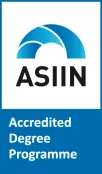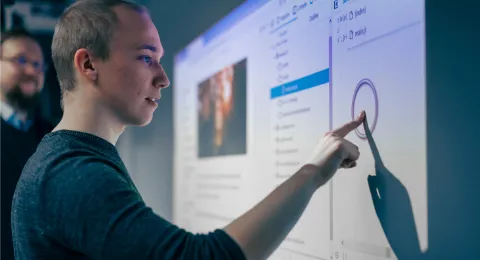The newsletter is your guide to what's happening on LUT campuses and the student community as well as to bachelor's and master's programmes updates and admission instructions. Newsletters will be delivered to your email once a month.


The programme is accredited by international Euro-Inf® (granted by EQUANIE) and ASIIN standards for high quality degree programmes in engineering.
The programme develops the competencies and skills required for the holistic, service-oriented design of systems and software. It combines service design methodologies with modern technologies, such as artificial intelligence, cloud computing, and distributed systems, to create advanced digital services.
The programme takes a holistic approach, applying modern methods such as no-code to leverage software infrastructures, data-driven systems, and connected technologies. The programme develops digital service expertise to support long-term, human-centred business success.
Teaching combines theoretical foundations with practical application. Courses employ innovative, interactive methods such as flipped classrooms and gamification while emphasising the practical, holistic development of digital systems and services.
The programme is flexible and blends distance, hybrid, and in-person teaching. However, it is primarily a full-time programme, with on-campus events held in Lahti.
Who is this programme for?
This programme is for you if you want to become an expert in the development of human-centred digital services that leverage state-of-the-art technologies, such as artificial intelligence and cloud computing. You are passionate about modern software engineering practices, service design, and creating innovative, sustainable solutions for the digital economy.
In addition, you have
- a bachelor's degree in technology, engineering, software engineering, computer science, information technology, business information technology, or a related discipline;
- a minimum of 24 ECTS credits of programme-specific studies in software engineering, software production, computer science, information technology, information systems / information systems science, business informatics / business information systems, data processing technology, business systems and analytics / business systems design, programming, databases, and data science;
- an interest in advanced technologies, such as artificial intelligence, cloud computing, and full-stack development, combined with a drive to adopt a service-oriented mindset.
Admissions guide 2026
What will you learn in the programme?
The programme takes an integral approach to software engineering, incorporating modern approaches, such as no-code, to leverage software and infrastructures, data-driven systems, and connected technology to ensure long-term and human-driven business success through digital services.
In this programme, you will become an expert in the development of human-centred digital services that incorporate state-of-the-art digital technologies.
You will acquire:
- skills to design, develop and evaluate data-driven and connected software-intensive smart services. You will learn to analyse, develop and manage new software-based digital services in the industry;
- competence to analyse a problem and identify and elicit human-centred needs and values for digital services;
- skills to design, evaluate and adapt software processes and software development tools to meet the needs of human-driven digital services;
- an international professional network by integrating into a multi-cultural working environment with a practical orientation and collaboration with companies.
Degree structure and studies
The Master's Programme in Digital Systems and Service Development is a two-year programme. It leads to the degree of Master of Science in Technology, M.Sc. (Tech.), which is 120 ECTS credits.
The programme includes core, advanced specialisation and elective studies as well as a Master's thesis. Read more in this academic year’s curriculum.
Career prospects
Understanding different dimensions of software engineering is necessary for any professional today.
There are many reasons why software engineering is so popular, such as good job security, high starting salaries, and diverse job opportunities across industries.
Graduates of this programme are well-equipped with competencies and skills to work as digital service engineers, cloud service engineers, smart service developers, service designer, project managers, software engineers, software systems architects or team leaders.
Contact Admissions Services
The LUT Admissions Services are here to assist you in all matters related to applying to international bachelor's and master's programmes.
For questions about admission criteria or entry requirements, please reach out to us by email: admission@lut.fi.
Chat with our students
Do you want to know more about studying at LUT, student life, or housing on LUT's campuses?
For questions about admission to bachelor's or master's degree studies, please email admission@lut.fi.





